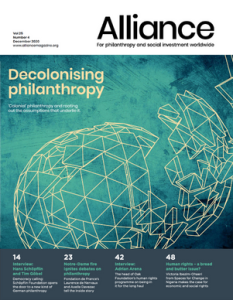Every sector grapples with its own issues and challenges, often publicly and not always productively. Despite commonalities in purpose, principles and values among its many actors, the international humanitarian sector is no different.
For more than a decade, I had a front-row seat to the humanitarian collective’s vacillating moods of self-flagellation, self-delusion and outright defensiveness that continues to hinder its ability to assess and diagnose systemic shortcomings. This is most visible today in the conversations around localization, or increasing the quality and quantity of direct funding flows to national organizations, and decolonising aid, or a redressing of global power dynamics within the development and humanitarian sectors, and how progress can be made.
The international aid sector needs a reckoning on its origins and on how we continue to perpetuate practices that reinforce systemic inequities. And by we, I mean those of us in the global north who work on humanitarian action, whether we consider ourselves a centre of power or not.
For example, you would be hard-pressed to find anyone working within an international humanitarian response that didn’t believe in the value and importance of local-led leadership and action. In fact, most would remind you that the primary role of the affected government is beyond important; it is enshrined in all major policies that guide humanitarian action[1]. Despite this, national leadership is too often dismissed or side-lined by international humanitarian actors, justified by overarching protection needs, capacity concerns or calls for a principled approach.
The genesis of the workarounds is, in part, connected to the UN’s affirmation of Responsibility to Protect, ‘to use appropriate diplomatic, humanitarian and other peaceful means, in accordance with Chapters VI and VIII of the Charter, to help protect populations from genocide, war crimes, ethnic cleansing and crimes against humanity[2].’ Many humanitarian organizations, especially international non-governmental organizations, often – and one could argue rightly – perceive holding offending governments accountable a critical aspect of their principled approach. Intentionally or not, this approach then creates an othering of the affected government and national NGOs, reinforcing unequal power dynamics.
These one-off defensible actions and attitudes have ripple effects, causing mistrust and creating misperceptions throughout the humanitarian system, with different categories of actors cast into specific stereotyped roles, often unconsciously. As a system of actors, we are blind to our biases, overly confident that due to our honorable raison d’être, our pursuit of humanity, we must already be acting in the best way possible.
But what happens when our way is no longer the best way or even the right way? So how do we improve? I’ve a few suggestions to help us start:
Check our hubris
Albert Einstein said, ‘The only true wisdom is in knowing you know nothing.’ Not an easy ask for a sector that has spent an incredible amount of time and effort professionalizing itself. We have worked hard to ensure that we are holding ourselves accountable to the affected communities and common standards, including coordinating effectively, being transparent and doing no harm to those we seek to serve. However, this expertise, even when guided by lived experiences, should not take primacy over listening to those at the centre of a crisis. We need to take more time to understand what’s asked of us and what we might need to do to change. We must accept that we don’t know everything. And we never will.
In the early days of the Covid-19 pandemic, my colleagues at the Center for Disaster Philanthropy, a funding intermediary that guides philanthropic giving towards equitable recovery, sought approval to fund a grant to support the US census. My 25+ years of working in the sector flared up, and I questioned my team, how does this help with the pandemic?
And that is when my own hubris was checked. My colleagues explained that the community was looking at the bigger picture. That part of the reason the pandemic was disproportionately impacting Black and brown people across the United States was decades of systemic inequities by not being seen or heard. Thus, for them, recovery started with being counted.
Be wary of checklists
Years ago, before the World Humanitarian Summit, there were other efforts at system reform. The loftily named ‘transformative agenda’ was one such effort. I clearly recall conversations with peers at the time on how the needed change management was quite simple, working smarter. And therein laid the greatest hurdle and the start of the decline of progress. Uncomfortable with a message on behavioral change, the system instead sought to define measurable processes and products.
By the end, the good ideas were no longer visible within the bureaucratized solutions presented from on high. The same behaviors are visible in the discussions around localization and decolonizing aid. For example, stuck on percentages as a target for localization, a debate on what constitutes ‘local’ takes primacy over exploring why donors are not willing or able to work more with national civil society organizations.
A similar debate on definitions and calls for action plans has already begun for decolonizing aid. We need to fight this urge. What is needed from all of us now is not a paper trail solution but a mind shift.
Recognise our biases
We get in our own way by accepting misconceptions and assuming that as it has been is how it should be. It is easy to blame our inability to adjust on donor preferences or regulations. We can hide our own privilege and ambition behind structures and systems on which we claim to have no influence, all while we benefit from them. Or when hindrances are put in our way by executive boards, parliaments or donors, our first response can be to educate and advise on alternative solutions.
We can take time to challenge ourselves on what other biases we carry and possibly perpetuate. False beliefs such as international equals more trustworthy or professional, or that local is cheaper, less principled or more at risk of fraud.
It is time for us to recognise and openly speak to how our certainty in our own virtue and expertise gets in the way of our listening, our following and our trusting those at the centre of crises.
Patricia McIlreavy is the President & CEO of the Center for Disaster Philanthropy.
Upcoming issue: Decolonising philanthropy
 The word ‘decolonisation’ was coined to describe the withdrawal of colonial powers from territories they had occupied. What forms have decolonisation practices taken among foundations? Should philanthropy be making reparations? And what significance does decolonisation have for philanthropic institutions when they are geographically distant from the former colonies? These are among the questions to be explored in the next issue of Alliance. Guest edited by Shonali Banerjee, Centre for Strategic Philanthropy, Cambridge University and Urvi Shriram, Indian School of Development Management.
The word ‘decolonisation’ was coined to describe the withdrawal of colonial powers from territories they had occupied. What forms have decolonisation practices taken among foundations? Should philanthropy be making reparations? And what significance does decolonisation have for philanthropic institutions when they are geographically distant from the former colonies? These are among the questions to be explored in the next issue of Alliance. Guest edited by Shonali Banerjee, Centre for Strategic Philanthropy, Cambridge University and Urvi Shriram, Indian School of Development Management.
Subscribe today to make sure not to miss it!





Comments (0)